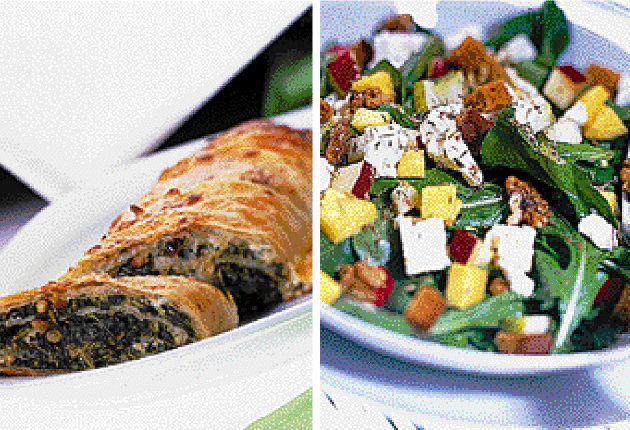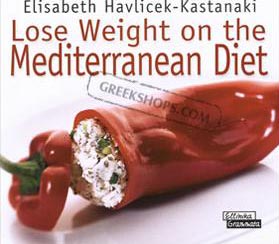 |
||
|
Fresh and wild
|
||
|
by Jennifer Gay
GATHERED wild from roadsides and in fields across Greece, horta (usually translated as "wild greens") comprise an enormous array of species, ranging from common radikia (dandelion leaves) to almyra (an Attica coastal special). Delicious simply boiled lightly and served with plenty of lemon juice (see first recipe), various types of horta could also be substituted into the other recipes that use the more internationally known, cultivated spinach. (Recipes yield four servings.) |
 |
|
Boiled greens Ingredients 1 kilo wild greens (one type, like dandelions, or mixed) 1 tbs cold-pressed olive oil juice of 1 lemon 1 tsp salt Preparation 1. Clean greens: trim roots and pick out yellowed leaves. Rinse well under cold running water, shake, and drain in colander. 2. In a large pot, bring water to boil. When it reaches a rolling boil, add greens a handful at a time. Cook for about 10 minutes, then strain. Reserve some cooking water. 3. Place greens in a large salad bowl. Toss with olive oil, lemon juice, two tablespoons of cooking water, and season with salt. 4. Garnish with lemon quarters and serve. You can buy salad greens at a farmers' market or even pick them yourself in the countryside in late winter or early spring. To uproot, loosen soil with a sharp knife and lift out. Collect in a bag. Spinach roll Spinach with feta
STEPHANOS Georgas, manager of Cellier wine shops, selects wines to please more demanding oenophiles. "In this category belong some of the choicest Greek wines," he says. "We have chosen to present the following five, keeping in mind their excellent relationship between quality and price. Chardonnay Antonopoulou (Chardonnay), Antonopoulos |
||
Buy this book at 30% off! This week's recipes are taken from Lose Weight on the Mediterranean Diet, by Elisabeth Havlicek-Kastanaki and published by Ellinika Grammata. You can now purchase this book for 11.20 euros, down from its usual price of 16 euros. This 30 percent discount is offered exclusively through the Athens News. You can pick up your reduced price copy in person from Ellinika Grammata bookshop (9 Christou Lada St, Athens). Or email your order to ladabookstore@ellinikagrammata.gr, or fax it to 210-333-3971. Include your name and address, the name of the book and the fact that you are taking advantage of this special offer. Do not include payment or a credit card number. A courier will deliver the book and collect payment in cash. There is a 4.50 euro delivery charge. For more information call Vassilis Tsonoglou at 210-333-3970. |
 |
|
|
|
||
(Posting Date 7 September 2006 ) HCS readers can view other excellent articles by this writer in the News & Issues and other sections of our extensive, permanent archives at the URL http://www.helleniccomserve.com./contents.html
All articles of Athens News appearing on HCS have been reprinted with permission. |
||
|
||
|
2000 © Hellenic Communication Service, L.L.C. All Rights Reserved. http://www.HellenicComServe.com |
||



